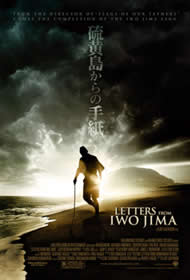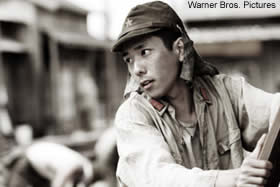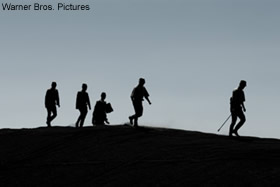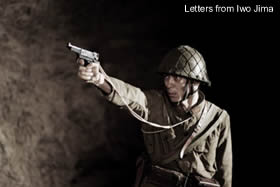 Equally as powerful and poignant as its predecessor, “Letters from Iwo Jima” marks the second film in response to “Flags of Our Fathers”, a deep and introspective look into one of the most decisive battles of the 2nd World War. This time, our vantage point is from the view of Japan and those men who fought to maintain their stronghold. Also a sacred part of Nippon’s heritage, we begin at Iwo Jima in present day, at a dig where remains of items of fallen soldiers prompt us to journey back into the mindsets of these men whose hearts, like US soldiers were grounded in home and family.
Equally as powerful and poignant as its predecessor, “Letters from Iwo Jima” marks the second film in response to “Flags of Our Fathers”, a deep and introspective look into one of the most decisive battles of the 2nd World War. This time, our vantage point is from the view of Japan and those men who fought to maintain their stronghold. Also a sacred part of Nippon’s heritage, we begin at Iwo Jima in present day, at a dig where remains of items of fallen soldiers prompt us to journey back into the mindsets of these men whose hearts, like US soldiers were grounded in home and family.
With an in depth perspective by Director Eastwood, we take the point of a view of several soldiers in the story, each writing home to their families concerning the war, embellishing their words with love for their spouses and children as well as infusing in it their sense of magnanimous pride. To serve one’s country and perish for the good of the country is the most good and highest  honor. Ken Watanabe plays an ex head of the Imperial Guard- a charismatic Lt. General Tadamichi Kuribayashi, commanding his men against an all out assault by American Forces which heavily outnumbered and outgunned them.
honor. Ken Watanabe plays an ex head of the Imperial Guard- a charismatic Lt. General Tadamichi Kuribayashi, commanding his men against an all out assault by American Forces which heavily outnumbered and outgunned them.
Thinking against the grain and with unorthodox strategy as opposed to other traditional officers, Kuribayashi orders circuits of caves and tunnels (instead of beach trenches) to house his 20,000 men as US Forces approach from Saipan. Some believed he was an American sympathizer since he was a student in America. In America, he had gained respect and friendship there. However, when questioned about his friendship and loyalty by his friend’s wife at his  farewell party, Kuribayashi remarked that both his convictions and his county’s convictions were one and the same- he would defend his homeland.
farewell party, Kuribayashi remarked that both his convictions and his county’s convictions were one and the same- he would defend his homeland.
Baron Nishi is a dashing officer lionized due to his victory at the Los Angeles 1932 Olympic games for the equestrian. He also shares his memories of America. Whereas Kuribayashi writes home about the many automobiles America has along with its budding technological advances, Nishi speaks of the United States to a wounded Marine he eventually befriends.
Additionally, the story delves into the lives of Saigo (Kazunari Ninomiya), a modest young baker who left back  home a wife and an infant daughter. A resilient soldier, he withstood the worst to eventually see the aftermath of war. His companion was Shimizu (Ryo Kase) an ousted Kempeitai (the Military Police for the Japanese Imperial Army). Following the shame of being ousted after five days for disobeying a direct order to shoot a village dog by a commanding officer, Shimizu’s last repose was to defend his homeland from the invaders, no matter what the cost.
home a wife and an infant daughter. A resilient soldier, he withstood the worst to eventually see the aftermath of war. His companion was Shimizu (Ryo Kase) an ousted Kempeitai (the Military Police for the Japanese Imperial Army). Following the shame of being ousted after five days for disobeying a direct order to shoot a village dog by a commanding officer, Shimizu’s last repose was to defend his homeland from the invaders, no matter what the cost.
When the Americans took foothold on the beaches of Iwo Jima, they sustained heavy losses due to Kuribayashi’s foresight. Despite the rallying of the men, the morale of some eventually diminished as Mt Suribachi was taken and suicide became the answer in order to die in honor. With Japanese forces now separated as well as effective communication between commanders, remaining survivors were ordered by Kuribayashi to unite with those in the north caves. Regarding
Kuribayashi as now weak, Lt. Ito (Shidou Nakamura), paved his own path, disregarding the Lt. General’s previously sound directives. The inevitable awaited and some sought surrender instead of death, tired of war and an unwavering desire to return home as discovered in the many letters unearthed during the present day dig.
 The film is a remarkable achievement by Eastwood who delivered in the midst of warfare, compassion for the enemy as we see the young US Marine, “Sam”, converse with Nishi. Conversely, Saigo, being treated by American forces. When the fallen Marine’s letter from his mother was read and translated into Japanese, it struck the heart of a soldier who remarked to his comrade, that that same feeling he also had experienced. Raised to believe that Americans were “savages”, a
The film is a remarkable achievement by Eastwood who delivered in the midst of warfare, compassion for the enemy as we see the young US Marine, “Sam”, converse with Nishi. Conversely, Saigo, being treated by American forces. When the fallen Marine’s letter from his mother was read and translated into Japanese, it struck the heart of a soldier who remarked to his comrade, that that same feeling he also had experienced. Raised to believe that Americans were “savages”, a
rethinking had enveloped the unit where, war became secondary to memories of home.
Regardless of the dire contention between both factions during this pivotal battle, what emerges is commonplace for us as a human species- the desire for home, community, family and peace.
Rating: A

